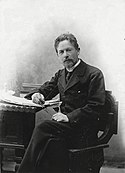Anton Chekhov Quote
Little girls ought to be taught and brought up with boys, so that they might be always together. A woman ought to be trained so that she may be able, like a man, to recognise when she's wrong, or she always thinks she's in the right. Instil into a little girl from her cradle that a man is not first of all a cavalier or a possible lover, but her neighbour, her equal in everything. Train her to think logically, to generalise, and do not assure her that her brain weighs less than a man's and that therefore she can be indifferent to the sciences, to the arts, to the tasks of culture in general. The apprentice to the shoemaker or the house painter has a brain of smaller size than the grown-up man too, yet he works, suffers, takes his part in the general struggle for existence. We must give up our attitude to the physiological aspect, too -- to pregnancy and childbirth, seeing that in the first place women don't have babies every month; secondly, not all women have babies; and, thirdly, a normal countrywoman works in the fields up to the day of her confinement and it does her no harm. Then there ought to be absolute equality in everyday life. If a man gives a lady his chair or picks up the handkerchief she has dropped, let her repay him in the same way. I have no objection if a girl of good family helps me to put on my coat or hands me a glass of water --
Little girls ought to be taught and brought up with boys, so that they might be always together. A woman ought to be trained so that she may be able, like a man, to recognise when she's wrong, or she always thinks she's in the right. Instil into a little girl from her cradle that a man is not first of all a cavalier or a possible lover, but her neighbour, her equal in everything. Train her to think logically, to generalise, and do not assure her that her brain weighs less than a man's and that therefore she can be indifferent to the sciences, to the arts, to the tasks of culture in general. The apprentice to the shoemaker or the house painter has a brain of smaller size than the grown-up man too, yet he works, suffers, takes his part in the general struggle for existence. We must give up our attitude to the physiological aspect, too -- to pregnancy and childbirth, seeing that in the first place women don't have babies every month; secondly, not all women have babies; and, thirdly, a normal countrywoman works in the fields up to the day of her confinement and it does her no harm. Then there ought to be absolute equality in everyday life. If a man gives a lady his chair or picks up the handkerchief she has dropped, let her repay him in the same way. I have no objection if a girl of good family helps me to put on my coat or hands me a glass of water --
Related Quotes
The downfall of the attempts of governments and leaders to unite mankind is found in this- in the wrong message that we should see everyone as the same. This is the root of the failure of harmony. Bec...
About Anton Chekhov
Chekhov renounced the theatre after the reception of The Seagull in 1896, but the play was revived to acclaim in 1898 by Konstantin Stanislavski's Moscow Art Theatre, which subsequently also produced Chekhov's Uncle Vanya and premiered his last two plays, Three Sisters and The Cherry Orchard. These four works present a challenge to the acting ensemble as well as to audiences, because in place of conventional action Chekhov offers a "theatre of mood" and a "submerged life in the text". The plays that Chekhov wrote were not complex, but easy to follow, and created a somewhat haunting atmosphere for the audience.
Chekhov at first wrote stories to earn money, but as his artistic ambition grew, he made formal innovations that influenced the evolution of the modern short story. He made no apologies for the difficulties this posed to readers, insisting that the role of an artist was to ask questions, not to answer them.
